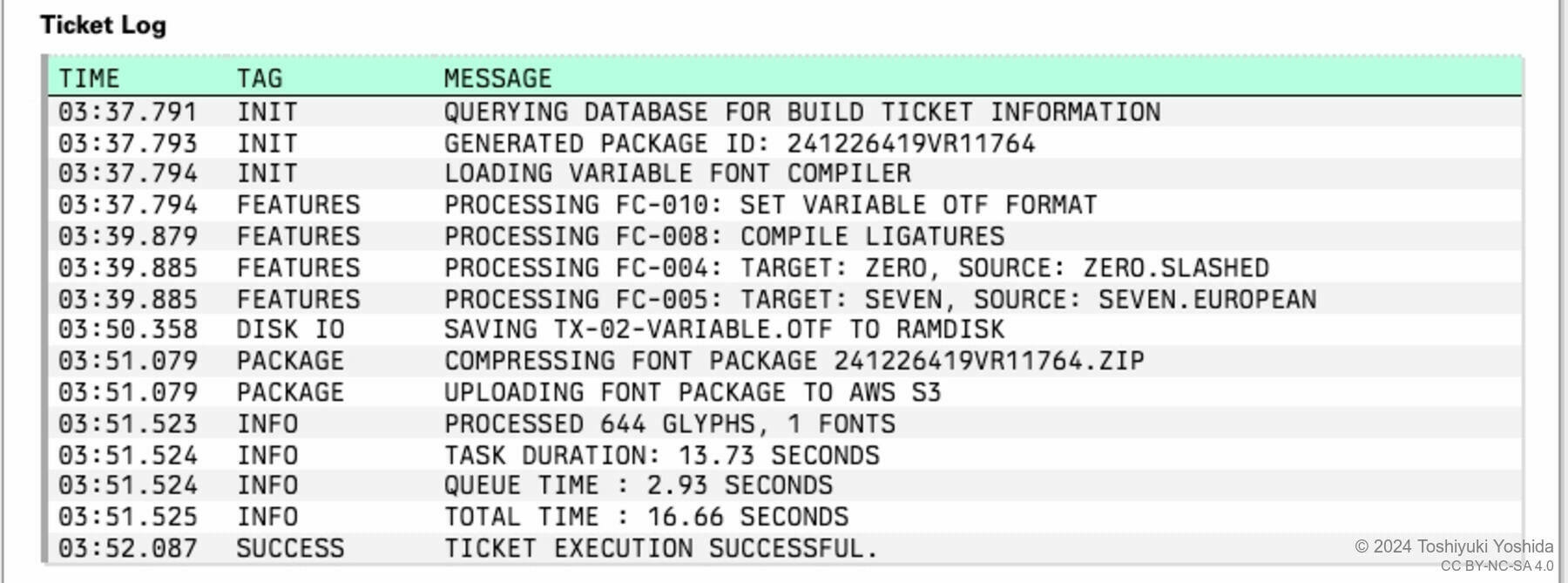Hands-on with Berkeley Mono v2 (TX-02): More Features and New Pricing Model
The Berkeley Mono font that I recently purchased has released a new Version 2.
Major Changes in Berkeley Mono Version 2
Berkeley Mono Version 2 includes the following changes:
- Font width variations have increased to five options: Normal / Semi Condensed / Condensed / Extra Condensed / Ultra Condensed
- Font weights have increased to 12 options
- Slants have increased to 2 options
- Variable fonts, which were previously split between normal and italic, now have three axes: width, weight, and slant
- Ligatures, which were in beta, are now officially supported with over 150 ligatures available
- Font name has changed from “Berkeley Mono” to “TX-02”
- Improved Glyph customization
- Addition of Super Type compiler for more detailed custom modifications
With the improved customization and addition of the Super Type compiler, the distribution method has changed. Previously, users would download prepared fonts after selecting glyphs, but now even with a standard license, fonts are compiled through the Standard compiler based on customization settings.

Berkeley Mono Version 2 License Changes
The license tiers have been divided more finely than before. The Developer License for individual users remains at $75 but now only includes “MX-002 Berkeley Mono™ Standard Fonts,” which contains:
- Width: Normal
- Weights: Regular, Bold
- Slants: Regular, Oblique(-16)
Web fonts and Variable fonts that were previously included are no longer part of the package, and ligatures that were available in beta can no longer be used, effectively making this a price increase.
As a previous Berkeley Mono™ Developer license owner, I was migrated to the following licenses with Version 2’s release1:
| SKU | Item | Price |
|---|---|---|
| MX-002 | Berkeley Mono™ Standard Fonts | inc |
| MX-007 | Berkeley Mono™ Master Fonts | $50.0 |
| MX-017 | Berkeley Mono™ Ligatures | $20.0 |
| TS-024 | Berkeley Mono™ Standard Compiler | inc |
I can now use the newly added width and weight variations along with ligatures. It seems they gave me a bonus worth $70.0 (thank you). However, Variable fonts and Web fonts now require the following additional licenses:
| SKU | Function | Price |
|---|---|---|
| MX-012 | Berkeley Mono™ Web Fonts | $45.0 |
| MX-030 | Berkeley Mono™ Variable Fonts | $24.0 |
Evaluation of Berkeley Mono Version 2
With Version 2, the font has become more flexible and suitable for a wider range of uses compared to Version 1. While the name change to “TX-02” makes it simpler to specify in configurations, it feels less personal and harder to develop an attachment to compared to the original “Berkeley Mono” name. Particularly, the significantly improved customization allows for more detailed adjustments when using it for programming and design.
For programming use, being able to adjust the font width and weight according to preference is a welcome feature. The Variable font is especially convenient as you can adjust to your preferred settings by simply changing the weight specification without switching between different fonts.
However, Web fonts, Variable fonts, and additional width and weight options now require additional licenses. While this may seem like a downgrade to existing users and partially unfavorable, I think it might be the best way to maintain prices while delivering extended functionality to those who need it, as users requiring these features are limited.
I didn’t purchase the Super Type compiler, but I did buy additional licenses for Web fonts and Variable fonts.
My WezTerm Font Settings for Berkeley Mono Version 2
While I don’t use Variable fonts in web environments due to compatibility issues, I do utilize them in my local environment. Below are my WezTerm font-related settings, updated for Berkeley Mono Version 2:
config.font = wezterm.font_with_fallback({
{
family = "TX-02",
weight = 400, -- Regular weight
style = "Normal",
},
{
family = "Hiragino Kaku Gothic",
weight = 400,
},
})
-- Settings for Bold and Oblique text
config.bold_brightens_ansi_colors = true
config.font_rules = {
{
intensity = "Bold",
font = wezterm.font({
family = "TX-02",
weight = 700, -- Bold weight
}),
},
{
italic = true,
font = wezterm.font({
family = "TX-02",
style = "Oblique",
}),
},
-- Bold + Oblique combination
{
italic = true,
intensity = "Bold",
font = wezterm.font({
family = "TX-02",
weight = 700,
style = "Oblique",
}),
},
}
-
I’m not sure if this migration was because of my recent purchase or if all users were eligible for migration. ↩︎